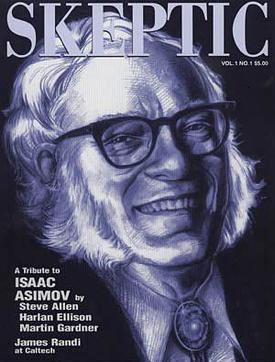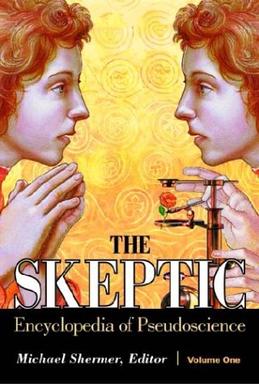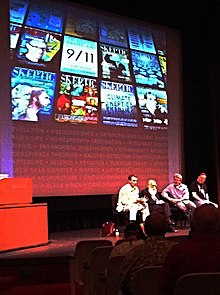
The Skeptic's Dictionary is a collection of cross-referenced skeptical essays by Robert Todd Carroll, published on his website skepdic.com and in a printed book. The skepdic.com site was launched in 1994 and the book was published in 2003 with nearly 400 entries. As of January 2011 the website has over 700 entries. A comprehensive single-volume guides to skeptical information on pseudoscientific, paranormal, and occult topics, the bibliography contains some seven hundred references for more detailed information. According to the back cover of the book, the on-line version receives approximately 500,000 hits per month.
James Randi Educational Foundation (JREF) is an American grant-making institution founded in 1996 by magician and skeptic James Randi. As a nonprofit organization, the mission of JREF includes educating the public and the media on the dangers of accepting unproven claims, and to support research into paranormal claims in controlled scientific experimental conditions. The organization announced its change to a grant-making foundation in September 2015.

The Committee for Skeptical Inquiry (CSI), formerly known as the Committee for the Scientific Investigation of Claims of the Paranormal (CSICOP), is a program within the U.S. non-profit organization Center for Inquiry (CFI), which seeks to "promote scientific inquiry, critical investigation, and the use of reason in examining controversial and extraordinary claims." Paul Kurtz proposed the establishment of CSICOP in 1976 as an independent non-profit organization, to counter what he regarded as an uncritical acceptance of, and support for, paranormal claims by both the media and society in general. Its philosophical position is one of scientific skepticism. CSI's fellows have included notable scientists, Nobel laureates, philosophers, psychologists, educators, and authors. It is headquartered in Amherst, New York.
Remote viewing (RV) is the practice of seeking impressions about a distant or unseen subject, purportedly sensing with the mind. Typically a remote viewer is expected to give information about an object, event, person or location that is hidden from physical view and separated at some distance. Physicists Russell Targ and Harold Puthoff, parapsychology researchers at Stanford Research Institute (SRI), are generally credited with coining the term "remote viewing" to distinguish it from the closely related concept of clairvoyance. According to Targ, the term was first suggested by Ingo Swann in December 1971 during an experiment at the American Society for Psychical Research in New York City.
Skeptical Inquirer is a bimonthly American general-audience magazine published by the Committee for Skeptical Inquiry (CSI) with the subtitle: The Magazine for Science and Reason.
Scientific skepticism or rational skepticism, sometimes referred to as skeptical inquiry, is a position in which one questions the veracity of claims lacking empirical evidence. In practice, the term most commonly references the examination of claims and theories that appear to be beyond mainstream science, rather than the routine discussions and challenges among scientists. Scientific skepticism differs from philosophical skepticism, which questions humans' ability to claim any knowledge about the nature of the world and how they perceive it, and the similar but distinct methodological skepticism, which is a systematic process of being skeptical about the truth of one's beliefs.

Michael Brant Shermer is an American science writer, historian of science, executive director of The Skeptics Society, and founding publisher of Skeptic magazine, a publication focused on investigating pseudoscientific and supernatural claims. The author of over a dozen books, Shermer is known for engaging in debates on pseudoscience and religion in which he emphasizes scientific skepticism.
A debunker is a person or organization that exposes or discredits claims believed to be false, exaggerated, or pretentious. The term is often associated with skeptical investigation of controversial topics such as UFOs, claimed paranormal phenomena, cryptids, conspiracy theories, alternative medicine, religion, or exploratory or fringe areas of scientific or pseudoscientific research.

Skeptic, colloquially known as Skeptic magazine, is a quarterly science education and science advocacy magazine published internationally by The Skeptics Society, a nonprofit organization devoted to promoting scientific skepticism and resisting the spread of pseudoscience, superstition, and irrational beliefs. First published in 1992, the magazine had a circulation of over 50,000 subscribers in 2015.

Paul B. MacCready Jr. was an American aeronautical engineer. He was the founder of AeroVironment and the designer of the human-powered aircraft that won the first Kremer prize. He devoted his life to developing more efficient transportation vehicles that could "do more with less".

Ghost hunting is the process of investigating locations that are purportedly haunted by ghosts. Typically, a ghost-hunting team will attempt to collect evidence supporting the existence of paranormal activity.
The New England Skeptical Society (NESS) is an American organization dedicated to promoting science and reason. It was founded in January 1996 as the Connecticut Skeptical Society, by Steven Novella, Perry DeAngelis and Bob Novella. The group later joined with the Skeptical Inquirers of New England (SINE) and the New Hampshire Skeptical Resource to form the New England Skeptical Society. The society publishes The Skeptics' Guide to the Universe, a science and scepticism podcast.

Alfred Paul "Al" Seckel was an American collector and popularizer of visual and other types of sensory illusions, who wrote books about them. Active in the Freethought movement as a skeptic in the 1980s, he was the co-founder and executive director of the Southern California Skeptics. News coverage arising from his connection to Jeffrey Epstein has stressed Seckel's misrepresentation of his education and credentials.

The Skeptic Encyclopedia of Pseudoscience is a two-volume collection of articles that discuss the Skeptics Society's scientific findings of investigations into pseudoscientific and supernatural claims. The editor, Michael Shermer, director of the Skeptics Society, has compiled articles originally published in Skeptic magazine with some conceptual overviews and historical documents to create this encyclopedia. It was published by ABC-CLIO in 2002.
Skepsis ry or the Finnish Association of Skeptics is a Finnish scientific skepticism organization founded in 1987.

Sharon A. Hill is an American science writer and speaker known for her research into the interaction between science and the public, focusing on education and media topics. Hill's research has dealt mainly with paranormal, pseudoscience, and strange natural phenomena and began at the University at Buffalo, where she performed her graduate work in this area. Hill attended Pennsylvania State University, earning her Bachelor of Science degree in geosciences and working as a Pennsylvania geologist.
Scientific skepticism is the practice of questioning whether claims are supported by empirical research and have reproducibility, as part of a methodological norm pursuing "the extension of certified knowledge". Scientific skepticism, or skepticism for short, manifests itself since the 20th century as a societal phenomenon involving several individuals and more or less organised groups through several different media, commonly referred to as "the skeptical movement". This is a compilation of the various lists about skepticism with articles in Wikipedia.

CSICon or CSIConference is an annual skeptical conference typically held in the United States. CSICon is hosted by the Committee for Skeptical Inquiry (CSI), which is a program of the Center for Inquiry (CFI). CSI publishes the magazine Skeptical Inquirer.










